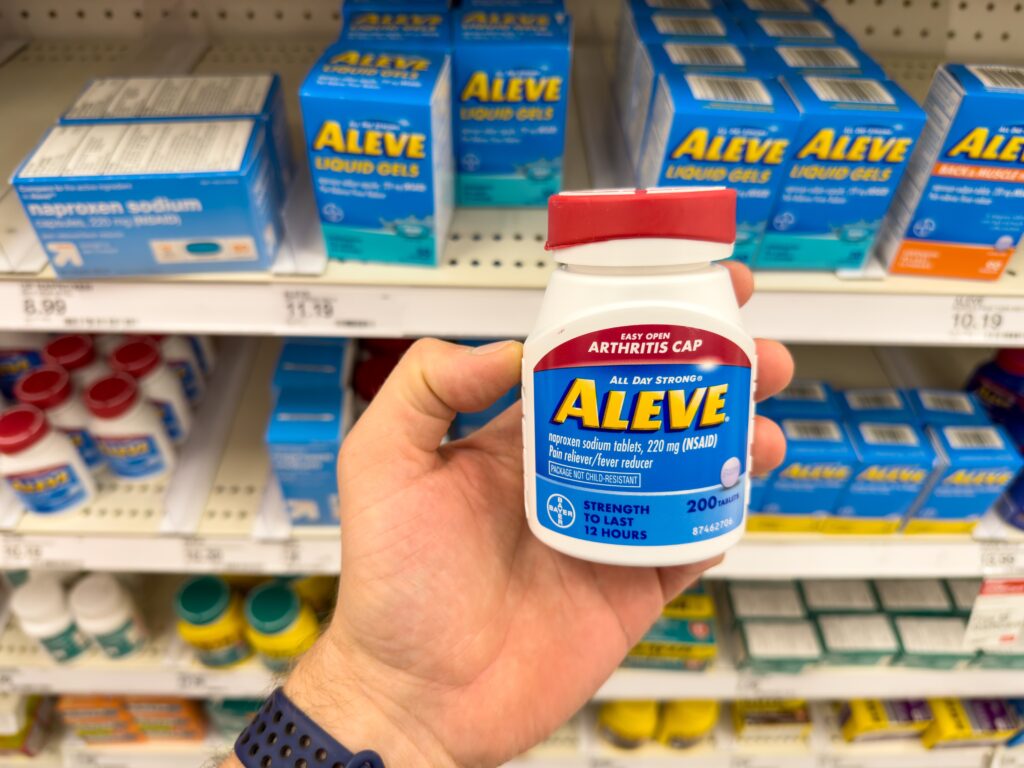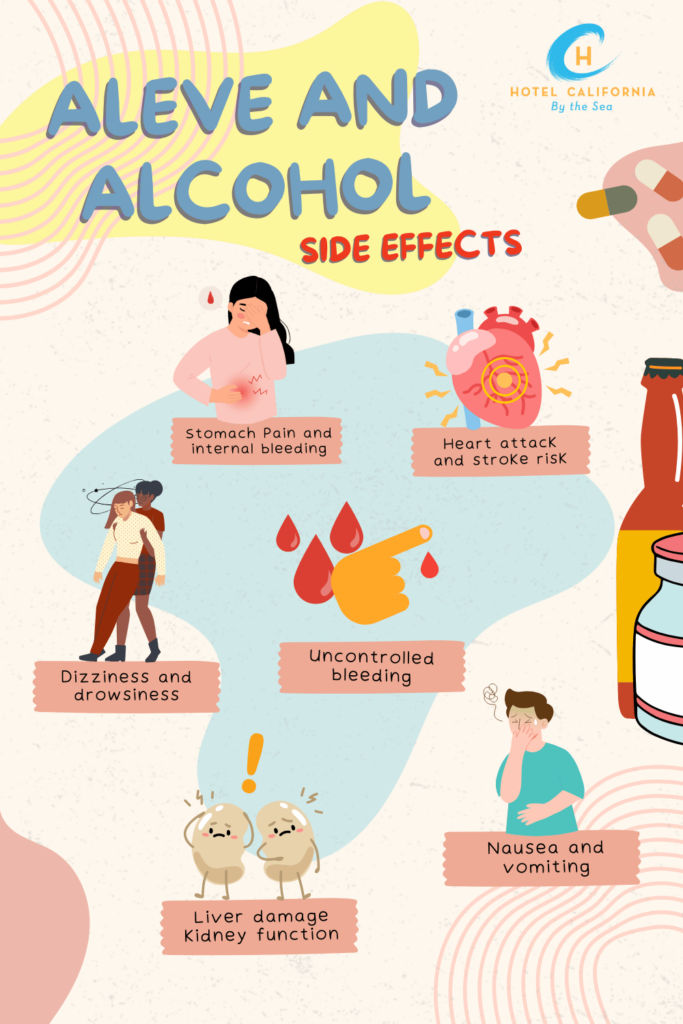Aleve and Alcohol
Is mixing Aleve and alcohol safe? Aleve is a brand of non-steroidal anti-inflammatory drug (NSAID) used to treat fevers, relieve headaches, relieve muscle pain, relieve menstrual pain and relieve pain from arthritis. It is a common over-the-counter painkiller. Alcohol is a central nervous system depressant drug often used recreationally. It is an intoxicating substance that can cause a sense of euphoria. What are the consequences of using both substances together?

Taking an over-the-counter painkiller with alcohol doesn’t seem like it would cause any major issues. Especially because they are both legal substances that can easily be found or obtained. However, even the most seemingly harmless drug combination can be dangerous. In general, it is not recommended to use the two drugs at the same time.
Aleve can be found over the counter at your local pharmacy, grocery store or convenience store. Alcohol is also sold at many retailers, including grocery stores and specialty stores. Aleve and alcohol are both substances that have a direct impact on your internal organs and taking them together can intensify any harmful side effects of each drug. And it can ultimately lead to the development of an alcohol use disorder.
History of Aleve
Non-steroidal anti-inflammatory drugs (NSAIDs) were invented back in 1976. Today, NSAIDs have more than 10 million prescriptions filled every year. The generic name for Aleve is naproxen sodium. The over-the-counter NSAID is similar to ibuprofen and can be obtained without a prescription.
Other brands of naproxen include Anaprox, Flanax and Naprosyn. It is a popular painkiller that can help with temporary pain relief. It can effectively treat arthritis of the spine, gout, inflammation of the joints, tendon inflammation and menstrual cramps. Bayer, the parent company that manufactures Aleve, recommends not taking the medication for more than 10 days for pain and 3 days for a fever. It can cause drastic damage to your stomach lining.

How does Aleve work?
How does Aleve work? Aleve works to reduce inflammation in the body. It reduces and inhibits the synthesis of prostaglandin in the body. It does this by blocking the effects of cyclooxygenases (COX) enzymes. These enzymes are responsible for producing prostaglandins. Prostaglandins are a naturally occurring hormone that the body makes. Prostaglandins have many functions in the body.
They can cause inflammation, pain and fever in the inflammatory process. They can elevate body temperature and make nerves more sensitive to pain signals, which then contribute to the sensations of pain during the body’s healing process.
For example, when your body has an injury, it releases prostaglandins to the injury site. This contributes to the inflammation, swelling and fever that can develop. It makes your nerve receptors more sensitive to pain.
On the other hand, prostaglandins are also responsible for preserving the inner lining of your stomach. It helps keep your gastric mucosa in check. It can inhibit acid secretion, stimulate mucus secretion, alter mucosal blood flow and provide a layer of protection against various factors that cause acute mucosal damage in the stomach. Prostaglandins act as a repair and maintenance guide of the stomach lining.
Risk of taking Aleve
- Gastritis – Gastritis is a precursor to developing stomach ulcers and other GI issues.
- Stomach bleeding – These are stomach ulcers that can occur because there is less protection of the stomach lining without the production of prostaglandins.
- Bruising
- Indigestion
- Headache
- Itchy skin
- Swelling
- Bloating
- Constipation
Alcohol
Alcohol is a commonly used substance, is widely available and legal, so it is easy to obtain. Society has a long history of using alcohol in both recreational settings and as a source of nutrition and food preservation. It is so common that many people don’t even think twice about the dangers of using alcohol and using it with other substances.
It is a central nervous system depressant that directly impacts the brain. Alcohol is a toxin that your body has to work to get rid of because of its negative impact on the brain, heart, liver, stomach and pancreas.
Alcohol can be especially harsh on the stomach. It stimulates the stomach to increase acid production, which irritates the stomach lining. It damages the gastric mucosa, making the person more susceptible to stomach injury and stomach ulcers. Excessive alcohol use increases the risk of gastritis and stomach bleeding.
Check Your Insurance Coverage for FREE
Find out if your insurance covers addiction treatment in minutes. We accept most insurance!
Side Effects of Alcohol Abuse
- Changes in behavior or mood
- Impaired reflexes
- Difficulty telling where you are in space
- Difficulty maintaining balance
- Headaches
- Lowered inhibitions
- Nausea and vomiting
- High blood pressure
- Stomach leakage and stomach bleeding
- Slowed breathing or difficulty breathing
- Insomnia
- Weaken the immune system making it more difficult to fight inflammation
- Worsening anxiety and depression
What are the dangers of Polysubstance Use: Aleve and Alcohol?
It is generally ok to drink alcohol while taking Aleve, but it is not recommended. Aleve needs to be taken as directed and alcohol should only be used in moderation. If both drugs are being used in excess or abused, it can cause dangerous side effects. Both substances have a direct impact on your internal organs, specifically the health and wellness of your gastrointestinal system.
Risks of Aleve and Alcohol
- Dizziness and lightheadedness
- Drowsiness
- Fluid retention
- Nausea and vomiting
- Increased stress – This can lead to increased stomach acidity.
- Decreased kidney function – It can worsen kidney function.
- Liver damage – Both substances heavily impact the liver and can cause the liver to work overtime, leading to toxicity buildup and damage.
- Gastrointestinal issues – It can cause indigestion, abdominal pain, vomiting blood, holes in the stomach lining, bleeding stomach ulcers and stomach cancer. It also causes a high risk of gastritis.
- Cardiovascular issues – NSAIDs increase the risk of heart attacks and stroke. Large amounts of alcohol can also put strain on the heart and increase the likelihood of high blood pressure.
- Alcohol use disorder – The frequent use of both drugs can lead to developing a physical and psychological dependence and addiction to alcohol.
- Uncontrolled bleeding – It is a serious risk and requires immediate medical attention.
How to reduce the harmful risks of Aleve and Alcohol
- Only take one NSAID at a time due to the increased risk of stomach issues
- Understand your health history and don’t take any NSAIDs if you have a history of stomach ulcers or stomach bleeding
- Use Aleve and other NSAIDs only as directed
- Avoid drinking alcohol in excess while on Aleve
Reach out to Hotel California by the Sea
We specialize in treating addiction and other co-occurring disorders, such as PTSD. Our Admissions specialists are available to walk you through the best options for treating your addiction.
Treatment for Substance Use Disorder
Many people are unaware of the dangers of mixing Aleve and alcohol. Using both drugs can exacerbate the side effects of both substances and can also counteract the effects of Aleve on inflammation. When using too much of both, it can dramatically increase the risk of stomach bleeding, gastritis and ulcers. It can also lead to the development of an alcohol use disorder. Professional behavioral health treatment programs such as Hotel California by the Sea, provide treatment for alcohol addiction.
We offer treatment at all levels of care including detox, residential, PHP and IOP. We utilize evidence-based methods such as CBT, DBT and EMDR therapy. Hotel California by the Sea is dedicated to helping clients reach their goals of sobriety and overcome their addiction.
References:
https://www.healthline.com/health/pain-relief/aleve-alcohol
https://www.epiphanywellnesscenters.org/aleve-and-alcohol
https://psyclarityhealth.com/what-you-need-to-know-about-combining-naproxen-and-alcohol
https://alcoholrehabhelp.org/interactions/naproxen/
https://www.singlecare.com/blog/naproxen-and-alcohol/
https://vertavahealth.com/polysubstances/alcohol-naproxen/
